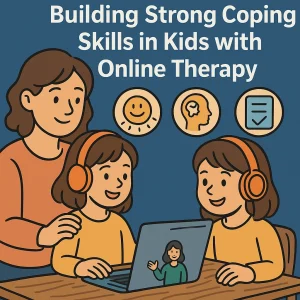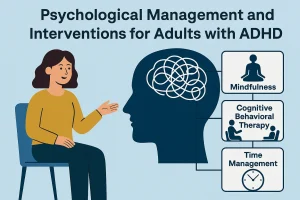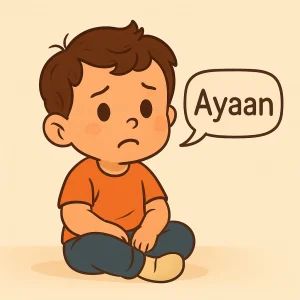Attention Challenges in Kids: A Simple Guide for Parents
Last Updated: September 18, 2024
As a parent, you may have noticed that your child sometimes struggles to pay attention or stay focused. While occasional distractions are normal for kids, persistent attention challenges can impact their daily lives in significant ways. From school performance to social interactions and emotional well-being, attention difficulties can create hurdles that affect your child’s overall development.
Understanding attention challenges in kids is crucial because it allows you to recognize the signs early and take appropriate steps to help your child. These challenges aren’t just about getting distracted during homework or being restless in class—they can influence how your child learns, interacts with others, and even feels about themselves. Addressing these issues early on can make a big difference in your child’s academic success, social skills, and emotional health.
Also read: 8 Essential Strategies to Improve Child’s Focus and Attention
Understanding Attention Challenges in Kids
It’s normal for kids to get distracted sometimes, but when it happens a lot and starts affecting their learning or relationships, it might be more than just a phase.
What Are Attention Challenges?
Attention challenges are when kids have trouble focusing, staying on task, or paying attention for as long as they should for their age. These challenges can show up in school, at home, and with friends. Not all attention problems mean your child has ADHD—sometimes, it’s just about needing extra support.
Common Signs of Attention Difficulties
Here are some signs that might show your child is struggling with attention:
- Easily Distracted: Your child may jump from one thing to another, especially if there’s a lot going on around them.
- Trouble Following Directions: They might forget steps, not finish tasks, or seem like they’re not listening.
- Disorganized: They may lose things often or struggle to keep track of schoolwork and routines.
- Impulsive: Acting without thinking or interrupting others frequently.
- Restless or Fidgety: They may have a hard time sitting still or always need to move.
Is It Normal or Attention Challenges?
All kids get distracted, especially younger ones, but how do you know if it’s more than that?
- How Often: If your child is often distracted in different places—home, school, or play—it might be more than just typical behavior.
- Impact: If it’s affecting their grades, friendships, or how they feel about themselves, it’s worth paying attention to.
- Age Matters: Younger kids naturally have shorter attention spans. But if your child is struggling more than others their age, it could be time to look closer.
Causes of Attention Challenges in Children
Figuring out why your child has trouble paying attention can help you find the right ways to support them. There are several reasons why kids might struggle with focus, and it’s usually a mix of different things. Here’s a simple look at some common causes:
1. Genetic Factors
Attention challenges can sometimes run in families. If you or other relatives had similar issues as kids, your child might, too. Genetics can affect how the brain works, making it harder for some children to focus, stay organized, or control impulses.
2. Environmental Influences
A child’s surroundings can impact their attention. Stressful or chaotic environments, lack of a daily routine, or exposure to things like lead can make it hard for kids to concentrate. Even things like too much noise or distractions at home can play a role.
3. Lifestyle Factors: Sleep, Diet, and Screen Time
Daily habits also matter. Not getting enough sleep can make kids tired and cranky, which affects their focus. What they eat counts, too—too much sugar or junk food can lead to energy crashes and trouble paying attention. Screen time is another big factor; spending too much time on tablets, phones, or video games can overstimulate the brain and make it hard for kids to focus on schoolwork or other tasks.
4. Medical Conditions Like ADHD
Sometimes, attention challenges are linked to conditions like ADHD (Attention-Deficit/Hyperactivity Disorder). ADHD can affect how kids focus, manage their impulses, and stay on task. But remember, not all attention issues are ADHD; other things like anxiety, learning problems, or sensory issues can also cause trouble with focus.
Also read: Top 5 Tips for Keeping Your ADHD Child Focused and Engaged
The Impact of Attention Challenges on a Child’s Life
Attention challenges can touch many parts of a child’s life, from school to friendships, and even their self-esteem. Understanding these impacts can help you see why it’s important to address these challenges early on.
1. How Attention Difficulties Affect School Performance
Children with attention challenges often struggle in school. They might find it hard to listen to instructions, stay on task, or finish assignments on time. This can lead to frustration for both the child and their teachers. Over time, they may start to fall behind in their studies, leading to lower grades. It’s not that these kids aren’t smart or capable—they just need a bit more support to stay focused and organized in the classroom.
2. Social and Emotional Impacts on Children
Attention issues can also affect how children interact with others. They might find it hard to follow conversations, wait their turn, or pick up on social cues. This can make making and keeping friends more challenging. They might feel left out or misunderstood, leading to feelings of loneliness or frustration. Emotionally, they might become easily overwhelmed or anxious because they can’t keep up with what’s happening around them.
3. Potential Long-Term Effects if Not Addressed
If attention challenges are not addressed early, they can have long-term effects. Academically, children may continue to struggle in school, which can affect their opportunities for higher education and careers later in life. Socially, ongoing difficulties can lead to problems with self-esteem and confidence. Emotionally, untreated attention issues can contribute to anxiety, depression, or other mental health concerns as they grow older.
Effective Strategies for Managing Attention Challenges
If your child has trouble paying attention, there are simple strategies you can try at home to help them focus better. Here are some easy tips and steps that can make a big difference:
Practical Tips for Parents
- Establishing Routines and Structure: Kids do well when they know what to expect. Set up a daily routine with regular times for waking up, eating, doing homework, playing, and going to bed. A clear schedule helps your child know what comes next and makes it easier for them to focus.
- Creating a Distraction-Free Environment: A quiet and tidy space can help your child pay attention. Set up a spot for homework away from noise and distractions like TV or toys. A clean, calm area can make it easier for them to concentrate on what they need to do.
- Using Positive Reinforcement to Improve Focus: Positive reinforcement means praising or rewarding your child when they do well. For example, if they finish their homework without getting distracted, give them a small reward like extra playtime or a favorite snack. This encourages them to keep trying their best.
Also read: Boost Your Child’s Focus: The Power of Short Breaks
Behavioral Strategies
- Break Tasks into Smaller Steps: Big tasks can feel overwhelming. Help your child by breaking them down into smaller, simple steps. For example, instead of saying, “Clean your room,” say, “First, put away your toys, then make your bed.” Completing small steps makes the task seem easier.
- Use Visual Aids and Reminders: Visual aids like charts, checklists, or timers can help your child remember what they need to do. A simple checklist can show them the steps they need to follow, and a timer can help them know how long to focus on a task.
- Incorporate Movement Breaks: Kids with attention challenges often need to move. Allow short breaks for stretching, jumping, or taking a quick walk. These movement breaks can help them release energy and refocus on their tasks.
Comparing Behavioral Strategies for Managing Attention Challenges
| Strategy | Description | Why It Helps |
|---|---|---|
| Break Tasks into Steps | Divide large tasks into smaller, manageable parts or steps. For example, instead of asking your child to “clean their room,” you can break it down into steps like “pick up toys,” “put clothes in the laundry,” and “make the bed.” | Breaking tasks into smaller steps makes the task feel less overwhelming. It helps children focus on one small part at a time, improving their ability to stay on task and complete it without feeling discouraged. |
| Use Visual Aids | Use tools like charts, checklists, or visual schedules to outline tasks and routines. For example, a morning routine chart can show pictures of brushing teeth, getting dressed, and packing a school bag. | Visual aids help children remember what they need to do and in what order. They serve as constant reminders without needing repeated verbal instructions, which can reduce frustration and help keep kids on track. |
| Incorporate Movement | Allow for short breaks that involve physical movement, such as stretching, walking, or doing a quick exercise. You can use timers to set work periods followed by short activity breaks. | Movement breaks help reduce restlessness, improve mood, and re-energize children. Physical activity can increase blood flow to the brain, boosting focus and concentration when they return to their tasks. |
| Positive Reinforcement | Offer praise or small rewards when your child makes an effort or completes a task. This can be as simple as saying “Great job staying focused!” or offering a sticker or extra playtime. | Positive reinforcement encourages good behavior and motivates children to try their best. It builds their confidence and reinforces the idea that effort and focus lead to positive outcomes, making them more likely to repeat the behavior. |
Supporting Your Child at School
Helping your child manage attention challenges at school can make a big difference in their learning and overall experience. Here are some simple ways you can support your child’s success in the classroom:
1. Communicating with Teachers and School Staff
Good communication with your child’s teacher is key. Let the teacher know about your child’s attention challenges and share any strategies that work well at home. Teachers can also give you feedback on how your child is doing in class and suggest helpful adjustments. Regular check-ins, whether through emails or brief chats, can help keep everyone on the same page and ensure your child gets the support they need.
2. Exploring Accommodations and Support Services
Schools often have resources to help students with attention difficulties. Ask about possible accommodations that could support your child, such as:
- Preferential seating: Sitting at the front of the class can reduce distractions.
- Extra time on tests: Additional time can help your child complete tasks without feeling rushed.
- Quiet spaces for work: A less noisy environment can help them focus better.
Some schools offer special support services, like tutoring, counseling, or special education programs. Don’t hesitate to explore these options, as they can provide valuable help tailored to your child’s needs.
3. Homework Strategies to Help Maintain Focus
Homework can be especially challenging for kids with attention issues. Here are a few strategies to make it easier:
- Set a Routine: Have a set time and place for homework each day. A quiet, clutter-free area can help your child concentrate.
- Break It Down: Break homework into smaller tasks and encourage short breaks in between. This keeps it from feeling overwhelming and helps maintain focus.
- Use Tools: Tools like timers, checklists, or visual aids can help keep your child on track and show progress as they complete each step.
Lifestyle Changes to Improve Attention
Simple changes in your child’s daily routine can significantly improve their ability to focus and manage attention challenges. Here are some easy lifestyle adjustments that can help:
1. Importance of a Balanced Diet and Proper Nutrition
What your child eats can affect how well they concentrate. A balanced diet with plenty of fruits, vegetables, whole grains, and protein can keep their energy levels steady and support brain function. Avoiding too much sugar and processed foods can help prevent energy spikes and crashes that can make it hard for them to focus. Including foods rich in omega-3 fatty acids, like fish, can also boost attention and brain health.
2. The Role of Physical Activity and Outdoor Play
Regular physical activity is great for improving focus and reducing restlessness in kids. Exercise helps the brain by boosting blood flow, which can improve mood and attention. Encourage your child to engage in activities they enjoy, like riding a bike, playing a sport, or simply running around outside. Outdoor play also provides a break from screens and offers a natural way for children to explore and burn off energy.
3. Ensuring Adequate Sleep and a Consistent Bedtime Routine
Good sleep is essential for your child’s attention and overall well-being. Kids who don’t get enough sleep often struggle with focus and behavior during the day. Make sure your child gets the recommended amount of sleep for their age—usually between 9 to 12 hours for school-aged children. Establish a consistent bedtime routine that includes winding down with calm activities like reading or a warm bath, and keep bedtime the same every night, even on weekends.
Recommended Sleep Hours by Age
| Age Group | Recommended Sleep | Why It’s Important |
|---|---|---|
| 3-5 years | 10-13 hours per night | Preschoolers need plenty of sleep for growth and development. Adequate sleep supports learning, behavior, and mood, helping them manage emotions and stay active throughout the day. |
| 6-12 years | 9-12 hours per night | School-aged children benefit from a good night’s sleep to improve focus, memory, and academic performance. Sufficient sleep also helps regulate their emotions and reduces the likelihood of behavioral issues. |
| 13-18 years | 8-10 hours per night | Teenagers still need significant sleep for brain development, physical health, and emotional well-being. Proper sleep helps with attention, decision-making, and coping with stress, which are crucial during these formative years. |
4. Limiting Screen Time and Encouraging Interactive Activities
Too much screen time can make it harder for kids to focus on other tasks. Set limits on the amount of time your child spends on screens each day, including TV, tablets, and video games. Instead, encourage activities that require interaction, like puzzles, board games, or arts and crafts. These activities can help improve attention by engaging your child’s mind in different ways.
Conclusion
Helping a child with attention challenges can be tough, but starting early and providing the right support can make a big difference. It’s important to spot the signs early and take action, whether that means setting up routines, making lifestyle changes, or working with teachers. These small steps can help improve your child’s focus, behavior, and overall happiness. Remember, every little bit helps, and the goal is to find what works best for your child.
It’s normal to have good days and challenging ones, so be patient with your child and yourself. Keep trying different strategies, and don’t be afraid to ask for help when needed. You are not alone—many parents face similar challenges, and resources like WellnessHub can offer support and guidance. Celebrate your child’s progress, no matter how small, and keep focusing on their strengths. With your support, your child can learn to manage their attention challenges and continue to grow and thrive.
Frequently Asked Questions:
1. What are common signs of attention challenges in children?
Children with attention challenges may have trouble focusing, following instructions, completing tasks, or sitting still. They might also be easily distracted, forgetful, or have difficulty organizing their work and belongings.
2. How can I help my child focus better at home?
You can help your child by setting up a daily routine, creating a quiet space for homework, breaking tasks into smaller steps, and using positive reinforcement. Regular physical activity, a balanced diet, and limiting screen time can also improve focus.
3. What lifestyle changes can improve my child’s attention?
Simple lifestyle changes like ensuring a balanced diet, regular exercise, adequate sleep, and reduced screen time can help improve your child’s attention. Encouraging outdoor play and interactive activities also supports better focus and behavior.
4. How do attention challenges affect my child’s school performance?
Attention challenges can make it hard for children to stay focused in class, follow directions, or complete assignments on time. This can lead to lower grades, frustration, and difficulty keeping up with their peers.
5. What should I discuss with my child’s teacher about attention challenges?
Share your observations about your child’s attention challenges with the teacher and discuss strategies that might help in the classroom, such as preferential seating, extra time on tasks, or breaks during lessons. Regular communication can ensure consistent support.
6. When should I seek professional help for my child’s attention issues?
If your child’s attention challenges are significantly impacting their school performance, social interactions, or daily life, it may be time to seek professional help. A healthcare provider can evaluate your child and suggest appropriate interventions, such as therapy or other support services.
7. How can I support my child’s emotional well-being if they have attention challenges?
Be patient, offer plenty of encouragement, and focus on their strengths. Help them build confidence by celebrating small achievements and providing a supportive environment. Encouraging open communication about their feelings can also improve their emotional well-being.
8. Can attention challenges be managed without medication?
Yes, many strategies can help manage attention challenges without medication. Behavioral strategies, lifestyle changes, and supportive interventions at school and home can significantly improve attention and focus. It’s important to find what works best for your child.
9. What are the best activities to improve attention in children?
Activities that involve focus and interaction, like puzzles, board games, arts and crafts, or sports, can help improve attention. Outdoor activities and mindfulness exercises, like yoga or deep breathing, can also help children practice concentration and reduce restlessness.
10. How can screen time affect my child’s attention?
Excessive screen time can overstimulate your child’s brain, making it harder for them to focus on less stimulating activities like homework or reading. Limiting screen time and encouraging more interactive and hands-on activities can help balance their focus and attention skills.
About Author:
Lasya Vooturi,
Clinical Psychologist (A) & Behavioral Therapist
Lasya holds a Professional Diploma in Clinical Psychology from Amity University, where she deepened her understanding of psychological principles from March 2023 to March 2024. With over a year of dedicated experience as a Behavioral Therapist, Lasya has honed her skills in applying effective therapy techniques tailored to individual needs. Fluent in Telugu, Hindi, and English, she is adept at connecting with a diverse range of clients, ensuring comprehensive communication and understanding. Lasya’s approach is grounded in empathy and scientific rigor, making her a trusted ally in navigating mental health challenges.
Book your Free Consultation Today
Parent/Caregiver Info:
Client’s Details:
* Error Message









